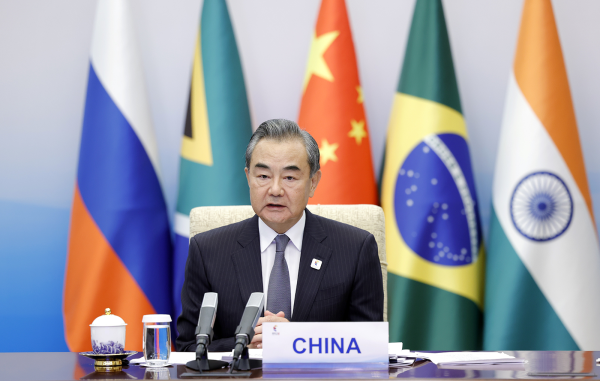The Global Security Initiative bridges the peace deficit and guides the way to solve global security dilemmas, said Chinese State Councilor and Foreign Minister Wang Yi while hosting a video conference of BRICS foreign ministers on Thursday.
In April's Boao Forum for Asia, President Xi Jinping proposed a Global Security Initiative (GSI), an idea taking security as the guiding principle, mutual respect as the fundamental requirement, indivisible security as the important principle, and building a security community as the long-term goal, in order to foster a new type of security that replaces confrontation, alliance and a zero-sum approach with dialogue, partnership and win-win results.
In the conference, Wang said the pursuit of "absolute security" and "exclusive security" will not work, stressing that countries should go beyond the you-win-I-lose Cold War mentality and respect and guarantee the security of every country.

Chinese State Councilor and Foreign Minister Wang Yi chairs a meeting of the BRICS Ministers of Foreign Affairs via video link, May 19, 2022. /Chinese Foreign Ministry
Chinese State Councilor and Foreign Minister Wang Yi chairs a meeting of the BRICS Ministers of Foreign Affairs via video link, May 19, 2022. /Chinese Foreign Ministry
He called for replacing confrontation with dialogue, coercion with consultation, alliance with partnership and zero-sum with win-win.
Wang also said countries should practice genuine multilateralism and oppose all kinds of unilateral sanctions and practices of "long-arm jurisdiction."
The principle of indivisible security must be implemented to promote a balanced, effective and sustainable regional security architecture, he said.
'Delivery of weapons cannot bring peace to Ukraine'
As for the drawn-out Ukraine crisis, Wang said the Chinese side's position has always been consistent in facilitating dialogue for peace.
"The delivery of weapons cannot bring peace to Ukraine while sanctions and pressure cannot solve the European security dilemma," he said.
The international community should pool its efforts to achieve peace, and all parties should take practical action to cool down the conflict instead of adding fuel to the fire, Wang said.
The Chinese foreign minister said China supports and expects Russia and Ukraine to overcome difficulties and continue peace talks. He also called on NATO and the EU to engage in a comprehensive dialogue with Russia.
China is opposed to some countries weaponizing international financial cooperation and asking other countries to take sides by coercion, he said.
Noting that the crisis is impacting international trade, stability of the industrial supply chain and threatening global food, energy and financial security, Wang urged efforts to reduce the crisis's spillover effects, especially to support vulnerable developing countries overcome the difficulties.
He also stressed the necessity of guarding against any attempt to incite bloc confrontations around the world, adding that such an attempt will pose a serious threat to global security and stability.
BRICS countries should continue to adhere to independence, objectivity and impartiality on the Ukraine issue, speak out and do their best for peace.
'Divisive 'alternative systems' should be boycotted'
Wang also called on the BRICS countries to boycott divisive practices and build an open world economy.
Some individual countries, by building "small yards with high fences" and forming "alternative systems," are adopting irresponsible macroeconomic and monetary policies, Wang said.
That has worsened the uncertainty and imbalances in the recovery and squeezes the growth room and resources of emerging markets and developing countries, he added.
The BRICS countries should advocate mutually beneficial practices, build an open world economy and nurture an environment that is inducive to common development.

